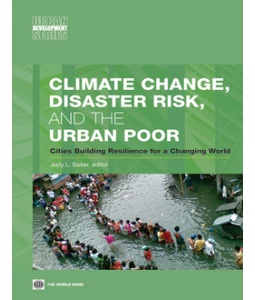 scribd.com/WorldBankPublications - April 2012
scribd.com/WorldBankPublications - April 2012
Poor people living in slums are at particularly high risk from the impacts of climate change and natural hazards. They live on the most vulnerable lands within cities, typically areas that are deemed undesirable by others and are thus affordable. Residents are exposed to the impacts of landslides, sea-level rise, flooding, and other hazards.
Exposure to risk is exacerbated by overcrowded living conditions, lack of adequate infrastructure and services, unsafe housing, inadequate nutrition, and poor health. These conditions can turn a natural hazard or change in climate into a disaster, and result in the loss of basic services, damage or destruction to homes, loss of livelihoods, malnutrition, disease, disability, and loss of life.
This study analyzes the key challenges facing the urban poor given the risks associated with climate change and disasters, particularly with regard to the delivery of basic services, and identifies strategies and financing opportunities for addressing these risks.
Several key findings emerge from the study and provide guidance for addressing risk:
Recent Comments